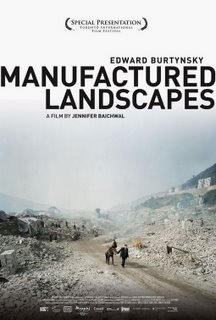
Edward Burtynsky’s China photos explore what has always been a veritable fount of intriguing images. Recalling Antonioni’s 1972 Chung Guo China, which in a coolly detached manner examined the ordinary, everyday facet of a society that was nevertheless rife with political tension, his work, with equal detachment, goes underneath the surface of prosperity, and discovers tension of an entirely different kind: us vs. nature.
Burtynsky’s photos come alive on the big screen in Jennifer Baichwal’s Manufactured Landscapes, as the camera follows his footsteps to China and lingers on some of the very same frames. Opening anonymously enough at this year’s Toronto International Film Festival, this documentary nevertheless found some success on its own terms, at least judging by the crowds on a Friday night in its second week of general release.
Not that surprising, because Burtynsky’s photos are gorgeous to look at. His keen eye for unconventional beauty took him to some unusual places: bustling and grimy coal mines; container seaports; remote villages where half of the world’s discarded computers and cell-phones end up; entire cities demolished in the wake of the Three Gorges Dam; mega-factories that employ thousands; and the seamy underbelly of Shanghai, where the living room of one jostles for space with the kitchen of the other, all in the open air on the street.
Interesting framing and lighting manage to bring out things we wouldn’t even think to look for.
Through his lens, piles of plastic transistors turn into a vibrant mosaic of colours, piles of coal into a study of sensuous contours; and scenes of people working to demolish their own cities in anticipation of the Dam get imbued with a marmoreal and post-apocalyptic beauty.
The whole notion of “ugly” beauty may seem a little ironic, but Burtynsky’s photos, and Manufactured Landscapes by association, work not because they pander to our sense of irony. These photos are quietly meditative, a quality that the film successfully recreates by moving at a glacial pace and saying little, but the sense of unease underlying the landscapes is unmistakably transmitted. As the film puts those stunning photos of transistors into context, it tells the story of how entire local economies in rural China have come to depend on imported junk electronics from which toxic components are scavenged and sold for money. Even the photos of Three Gorges Dam construction, while upbeat by social realism standards, are given a curious spin; put side by side with images of cities whose destruction it necessitates, and the glistening new ones it will support, the culminative effect is one that questions the fundamental sanity of the whole contraption.
Manufactured Landscapes hastily denies being China-bashing, and it isn’t. Just who are the perpetrators is a question with no easy answer and one that both Burtynsky and the film are wise enough to avoid. After all, most of the polluting junk electronics came from us in the West; and the decidedly un-quaint squalor of the Shanghai slums seems like a good moral case for China’s construction bonanza and energy hogging: who are we to be indignant, when we have had a free ride on cheap energy and, with our endless suburban subdivisions and super-highways, are probably just as guilty of tempering with the landscape?
The succinct “message” of Manufactured Landscapes, if there even is one, is that we are all implicated.
The refusal to be accusatory is the main strength of Manufactured Landscapes—emotionally un-satisfying perhaps, but necessary in light of the moral complexities of the issue. Yet it’s quite clear from Burtynsky’s photos who the victims are. In all his sweeping images of transformed landscapes, people are reduced to mere dots, toiling away complacently or perhaps haplessly, about to be swallowed, both in a literal and metaphorical sense, by the enormity of what they themselves have done. Thus is how civilization savagely but beautifully turns on itself.

1 comment:
Great review.
Post a Comment